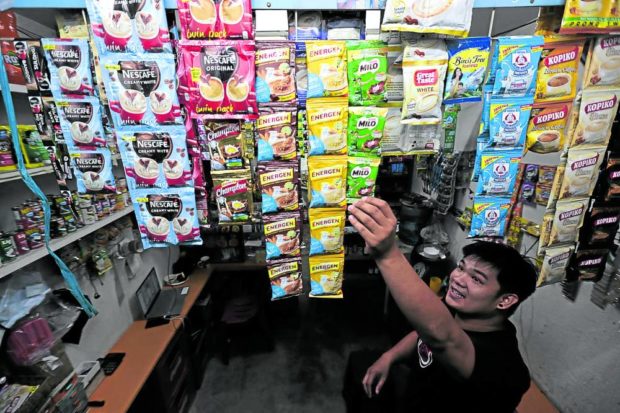More biodegradable replacements for plastics eyed

COMMON SIGHT A storekeeper arranges different brands of drinks in sachets at a “sari-sari” store in Quezon City.—GRIG C. MONTEGRANDE
New innovations could eventually help the Philippines transition to a more “sustainable sachet economy,” scientists said on Thursday, as they allayed concerns that the country’s plastic sachet culture was nothing but inevitable.
During a forum on microplastics hosted by the Department of Science and Technology (DOST), scientists Deo Florence Onda and Rey Capangpangan said the use of sachets—small pouches made of single-use plastics—could actually be maintained, but should be replaced with more biodegradable materials.
Onda and Capangpangan presented separate but concurring research into microplastics, or microscopic degraded plastic debris, in the Philippines’ marine ecosystems.
Both found that microplastics were now being ingested by marine life like shellfish and pelagic fish (those that live in water columns).
This was symptomatic of the country’s larger problem with plastic pollution, to which the Philippines contributes about 0.75 million metric tons to the ocean every year, said Science Secretary Renato Solidum Jr.
Article continues after this advertisementIn particular, Onda’s team, which began building a database on the macro—and microplastics found in coastal and marine environments, found that sachets were among the top culprits of plastic pollution in the Philippines.
Article continues after this advertisement“The use of sachets [caters] to a certain socioeconomic problem,” said Onda, who is also deputy director for research at the University of the Philippines’ Marine Science Institute. “However, science can help assist the transition to a more sustainable type of sachet.”
The DOST already has several studies on possible green alternatives to plastics, such as seaweed or hemp (abaca), Onda noted.
By exploring these alternatives, “you’re not only replacing the material, but you’re also helping sustain the economy, because you’re helping create [livelihood] for the farmers of these materials.”
Ultimately, this can even help the Philippines’ shift to a more circular economy, where waste is reduced to a minimum through repurposing or creating more sustainable value chains, Capangpangan said.
He said Filipino scientists could even explore the “atom economy,” or pollution prevention at a molecular level by replacing components of the material.
“We can always make modifications through the proper choice of raw materials,” he added.
While the country’s scientists work on possible alternatives, the national government is beefing up efforts to first address public behavior toward plastics while working on big structural changes to address plastic pollution.
Assistant Environment Secretary Daniel Nicer said the Department of Environment and Natural Resources was set to release the implementing rules and regulations for the newly passed Extended Producer Responsibility law, which requires large companies to keep a large percentage of their wastes away from landfills. INQ